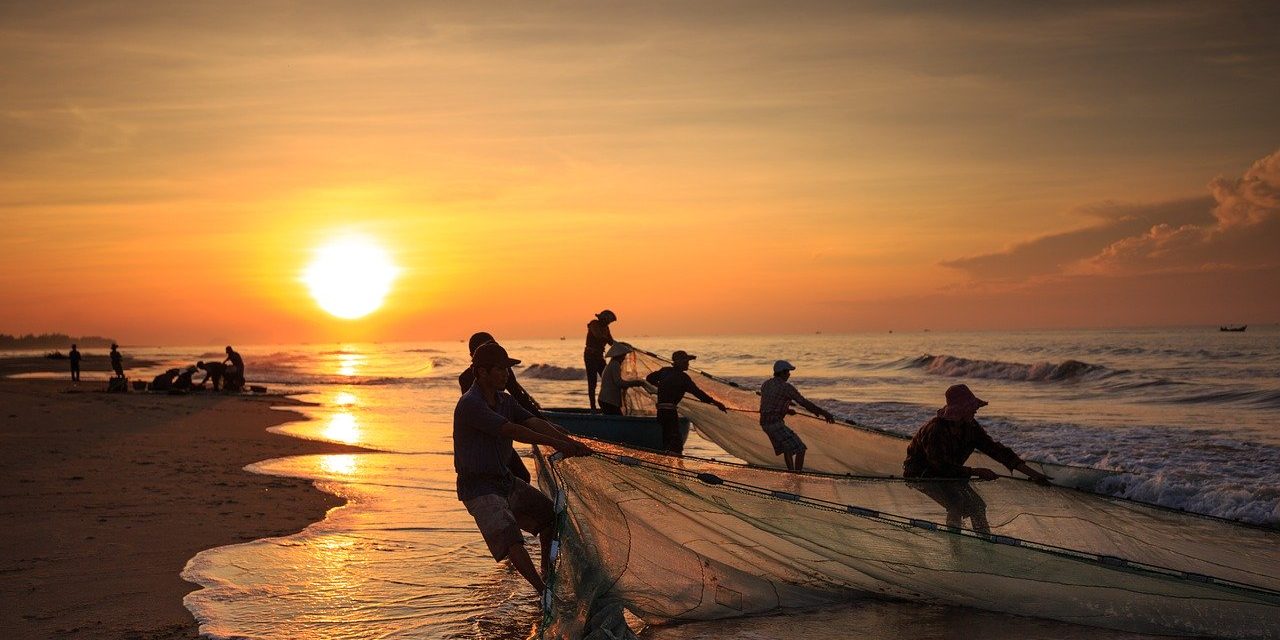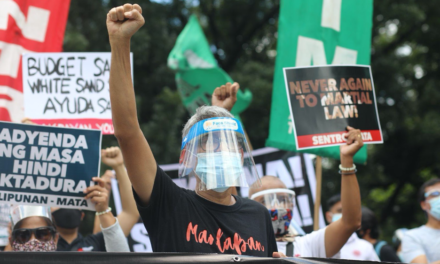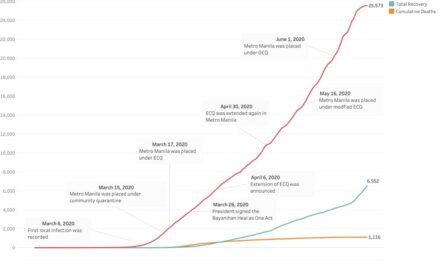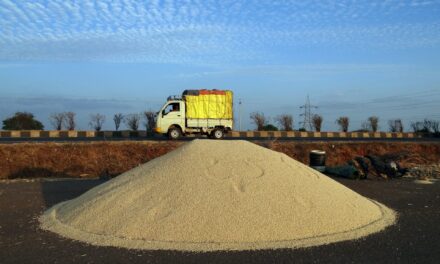Jakarta, April 17, 2020
Small-scale fishers and aquaculture have an important role and become a mainstay in sustaining national food sovereignty. In Indonesia, fishery products provide 54% of all animal protein consumed. Its contribution to job creation is also very important as the number of fishery businesses both directly and indirectly are huge. In Indonesia, the capture fisheries sector is estimated to provide direct jobs for more than six million people and indirect jobs for millions of others. About 97 percent of the total number of fishermen in Indonesia is small-scale viewed from the boat size which under 10 GT (gross tonnage).
Although fisherfolk have a quite a big role in the economy their living conditions are quite bad. 2.7 million fishermen constitute 25 percent of the national poverty rate, as most of them are living under poverty line. Around 53% families in coastal regions are also living in the same condition. It becomes a specific characteristic of the vulnerability of fishermen and fish farmers in the socio-economic context, particularly in facing the COVID-19.
The widespread of COVID-19 has not been accompanied yet by awareness and knowledge of fishermen and coastal communities about its impact. Dissemination of information and education from the government is also considered not optimal yet in the field. Therefore, many coastal residents are still confused and do not understand the purpose of government policies, for example, the implementation of physical distancing, or the prohibition to go for fishing in the morning.
Covid-19 Impact for Small-scale Fisher and Aquaculture
To find out more about the impact of the spread of the Covid-19 pandemic on small-scale fishers and aquaculture, KNTI conducted a survey to find out conditions on the ground, especially from regional KNTI officials in various regions. The data collection period was conducted from March 31 to April 10, 2020. The location for data collection was carried out in several regions which became the KNTI member base through questionnaires and in-depth study by telephone. Some of these areas include: Bulungan Regency and City of Tarakan-North Kalimantan, Aceh, Medan-North Sumatra, Tulang Bawang-Lampung, Bintan-Kepri, Serang-Banten, Tangerang-Banten, Thousand-DKI Jakarta Islands, Semarang-Central Java, Demak-Central Java, Indramayu-West Java, Pangandaran-West Java, Surabaya-East Java, Gresik-East Java, Lamongan-East Java, Sumenep-East Java, Maumere-NTT, West Manggarai-NTT, and East Lombok-NTB.
Most regions reported a significant decline in fish prices. Market has become an obstacle at the moment because many fish collectors do not serve or at least limit their purchase of fish from fishermen/farmers. As a result, many fishermen and fish farmer are overwhelmed to sell their catch, while the destination countries for Indonesian fisheries exports are imposing “lockdown”. The condition occurred due to the decline of people’s purchasing power that made market/TPI in quiet due to the implementation of the physical distancing policy.
Such condition is likely going to get worse, if we are doing nothing. The fishermen, who go fishing, will find it difficult to find buyers. Even if there are buyers, the price offered is absolutely cheap and make them suffer losses. In addition, the fishermen also complained about the operational costs such as fuel prices which remain expensive and scarce in some areas. These conditions make them hard to go for fishing. And now, they need to pay for living costs such as to buy staple foods which the prices currently are increasing in several areas. Other additional costs are also needed due to the pandemic time, such as to buy disinfectants. It means that the operational costs to go for fishing during the Pandemic period are relatively rising, while the income of fishermen has decreased. In addition to expensive fuel prices and to have budget for fishing, another obstacle is the boat’s administration. This was felt by members of fishermen who are in the district of North Semarang, Semarang City, Central Java.
The impact of Covid-19 is also felt by aquaculture sector. As reported by KNTI members in Tulang-lampung, Indramayu-West Java, Gresik-East Java, and East Lombok-West Nusa Tenggara. They faced difficulties to find seeds and production facilities such as food and medicine. Decreasing consumer demand, both local and international scale, resulted in sellers buying fish at half the normal price or even closing fish purchases. The existence of social distancing and regional restrictions or Large-scale Social Restrictions (PSBB) applied in several regions in Indonesia caused the hospitality and culinary sector to experience decrease, so that the demand for aquaculture fish is also reduced.
The need for production facilities is also a problem in the pandemic. The price of feed and medicines, especially those containing imported materials has increased. To prevent the swelling of production costs, farmers do harvest early. It happened to lobster cultivators in East Lombok-West Nusa Tenggara and Gresik-East Java. Fishpond such as milkfish are harvested in large quantities and sold at very cheap prices to prevent greater losses.
Another case is with milkfish pond farmers in Indramayu-West Java. The farmers harvest their ponds periodically or gradually. This is because there are restrictions on fish purchases by collectors, so that in order to maintain production, fishers harvest some of their fish and make it as capital to buy food for some of the remaining fish.
Overcoming this situation, various methods are used by fishers to adapt and survive in the midst of the current crisis situation. Fishermen or cultivators who still have savings, to guard when there are urgent needs such as education or health costs, start to withdraw savings to meet their daily needs or capital for fishing. But unfortunate for those who do not have savings, they must owe to neighbors, skipper, collectors or other parties who offer assistance. This phenomenon was reported by the management of the KNTI fishing cooperatives in Surabaya, East Java and Tarakan City, North Kalimantan. Another method is fishermen in Maumere Regency, East Nusa Tenggara. Overcoming the rising prices of basic necessities, they hastened the harvest of corn to maintain family food security. While others, trying to change the profession to become daily laborers or jobs that can generate daily income.
Fishermen in East Lombok, West Nusa Tenggara barter to meet their basic daily needs. Economic hardship in some areas has made fishermen choose not to go to sea anymore, because they do not have capital. Most of them become unemployed and stay at home because of the existence of a physical distancing policy. Unlike when famine or strong winds, some of them are determined to stay at sea with the risk of death or switch professions to become laborers in the area. This is the fishermen’s endeavor to keep earning income to meet their daily needs. KNTI identifies several efforts that the government can do including:
- Central Government and Local Government are encouraged to conduct massive education on the fishermen and aquaculture community about the impact of Covid-19 on health. Prevention efforts need to be made in fishing villages such as spraying disinfectants, mass testing, mask distribution, and so on;
- Encouraging the existence of a special scheme for fishermen and farmers in dealing with Covid-19 by integrating the purchase scheme of fishery products produced by small fishermen (in the upstream) by strengthening the national fish logistics system. Therefore, the function of the state in maintaining people’s purchasing power, protecting the economics of fishermen/farmer families, maintaining the availability of protein supply and strengthening the national fisheries economy in the midst of the Covid-19 outbreak will be maintained and running well.
- Central Government and Local Government as soon as possible do a refocusing and reallocate funds, specifically, programs aimed at protecting and preventing the impact of Covid-19 for Small-scale fishers and aquaculture communities, including the preparation of social safety net schemes;
- Encouraging digitization of fisheries businesses, both downstream and upstream. In the long term, digitization will expand the market access of fishery products to national or international markets. At the same time cut the fish trade chain which has been too long and is often detrimental to fish farmers. In the short term, digitization will support the government efforts and all of us to contain the spread of Covid-19. Fisheries organizations, fisheries business associations, central government and local governments need to strengthen their collaboration to accelerate the process of digitizing this national fishery.
- Ensuring that access to the supply of goods and logistics needed for fishing operations and fishing of fishery products can run smoothly. Cooperation from several sectors dealing with transportation, including ports, trains and planes for crossings in regions that apply a restriction system, so that sales of products can be maintained;
- Increasing access for small-scale fishers and aquaculture to credit and microfinance programs with low interest rates, flexible loan repayments, and options for restructuring loans.
Center Executive Board of Indonesian Traditional Fisherfolk Union (DPP KNTI)
Website: www.knti.or.id
Twitter: @dppkanti
Instagram: nelayan_bersatu
Facebook: knti.nelayantradisional
Contact person: Dani Setiawan (Ketua Harian DPP KNTI); [email protected]






![[IN PHOTOS] In Defense of Human Rights and Dignity Movement (iDEFEND) Mobilization on the fourth State of the Nation Address (SONA) of Ferdinand Marcos, Jr.](https://focusweb.org/wp-content/uploads/2025/07/1-150x150.jpg)



